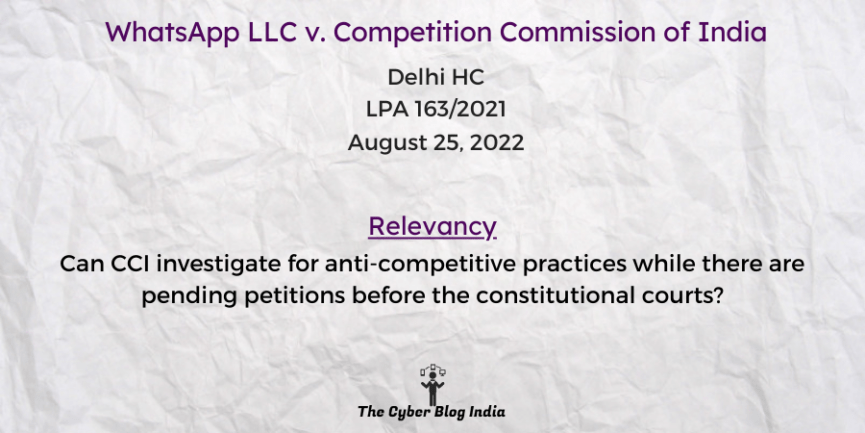WhatsApp LLC v. Competition Commission of India

WhatsApp LLC v. Competition Commission of India
(2022) 293 DLT 616
In the High Court of Delhi
LPA 163/2021
Before Chief Justice S.C. Sharma and Justice S. Prasad
Decided on August 25, 2022
Relevancy of the Case: Can CCI investigate for anti-competitive practices while there are pending petitions before the constitutional courts?
Statutes and Provisions Involved
- The Information Technology (Reasonable Security Practices and Procedures and Sensitive Personal Data or Information) Rules, 2011 (Rule 5(7))
- The Competition Act, 2002 (Section 4(2), 26(1))
- The Constitution of India, 1950 (Article 21)
Relevant Facts of the Case
- Facebook, now known as Meta Platforms, acquired WhatsApp in 2014. WhatsApp updated its Terms of Service and Privacy Policy in 201 after this acquisition6. This update informed the existing users about the acquisition and allowed them to opt out of Facebook using their information.
- However, this option was not available for new users. A petition was filed regarding this, and the appeal is pending before the Supreme Court.
- In 2021, WhatsApp again updated its Terms of Service and Privacy Policy. Challenges to this update are pending before the Delhi High Court and the Supreme Court.
- Meanwhile, the Competition Commission of India (CCI) took suo moto cognisance of the case and investigated the potential abuse of dominance.
- WhatsApp challenged the CCI’s order on the investigation before the Delhi High Court. The single-judge bench ruled in CCI’s favour and held that CCI had competent jurisdiction despite pending cases before the courts. The judge also held that CCI’s investigation order was administrative in nature and did not affect the appellants’ rights.
- The appellant has contested this single-judge bench’s order and appealed.
Prominent Arguments by the Advocates
- The appellant’s counsel submitted that users voluntarily opt to use WhatsApp’s services and must abide by the platform’s terms and conditions. Users who do not want their information shared with Facebook can choose to delete their accounts. Further, CCI has failed to establish a prima facie case under Section 26. Moreover, its claims under Section 4 are invalid.
- The respondent’s counsel contended that merely because the Supreme Court is looking into this aspect, there shall be no curtailment of CCI’s power to conduct the investigation. The Competition Act, 2002, gives CCI the power to investigate anti-competitive practices. Further, Section 4 categorically uses the term enterprise to denote the concept of a group that includes the appellant and its parent company.
Opinion of the Bench
- The constitutional courts are investigating whether the 2021 policy update violates the right to privacy under Article 21. CCI is investigating whether this update furthers the appellant’s dominant position. The sphere of operation is vastly different.
- Parallel inquiries by two different authorities in their respective spheres of adjudication are not uncommon. It does not mean that one must lead to the ouster of the other.
- The scope of Section 26(1) is administrative in nature. It will not impact the court’s adjudication on the issue of violation of fundamental rights.
- Competition concerns do arise as the 2021 update amounts to the imposition of unfair terms and conditions on users, which is in direct conflict with Section 4.
- The appellant’s contention that Facebook is a separate and distinct legal entity is not good in the eyes of the law. Facebook is the direct beneficiary of the data-sharing mechanism outlined in the 2021 Policy.
Final Decision
- The bench dismissed WhatsApp’s appeal.
Saatvika Reddy Sathi, an undergraduate student at Jindal Global Law School, Sonipat, and Upama Nandy, an undergraduate student at Symbiosis Law School, Pune, prepared this case summary during their internship with The Cyber Blog India in January/February 2023.
